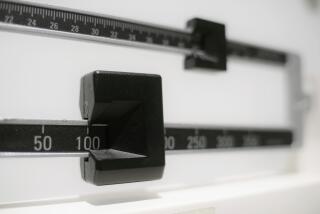Hungry after that workout?
Tris O’Shaughnessy runs on a regular basis: four to five days a week, for 30 to 45 minutes at a time. Every once in a while, though, she ratchets up her routine, extending her workouts or training for a race.
It’s then that she notices a change in her behavior. She’ll treat herself to eggs Benedict and a Bloody Mary at brunch, margaritas with dinner or extra cookies for dessert. “The way I get myself in the mood is I have to bribe myself. I go hog wild. If I want brownies for dinner, I have brownies for dinner,” she says. “That’s my reward.”
O’Shaughnessy’s bribe and reward system may sound familiar to those who grab a large latte after the gym or a cheeseburger and fries after a jog. In fact, the post-workout binge is so common that scientists have come up with a term for it: compensation. Researchers are now trying to figure out what makes some people compensate while others don’t.
An individual’s tendency to compensate has direct bearing on how easy -- or difficult -- it will be for that person to lose weight by exercising, says Timothy Church, a professor at the Pennington Biomedical Research Center at Louisiana State University in Baton Rouge, whose research has focused on compensation.
In studies of the effects of diet and exercise on body weight, there are inevitably some people who lose a lot of weight, some who lose very little weight -- and some who lose none at all. The last phenomenon led some scientists to speculate, as far back as a few decades ago, that exercise might not be a reliable means of shedding pounds. The reason, they proposed, was because it seemed to stimulate the appetite.
Studies have since shown that exercise can induce hunger. But it doesn’t do so in all people, and the effect is usually only temporary. Researchers surmise that the tendency to compensate is driven partially by actual hunger and partially by psychological factors. Why some people compensate and others don’t remains a mystery.
The research
In 1980, two researchers at the Western Psychiatric Clinic in Pittsburgh reviewed 16 studies on exercise and weight loss. They noted, among other findings, that those people who lost the least weight when embarking on an exercise regimen seemed to do one of two things: They either ate more than usual or they were less active than usual outside of the time they spent exercising.
These changes in behavior ultimately meant that their ratio of calories burned to calories consumed was little changed -- despite the addition of exercise to their routines. This tendency to compensate for calories burned appeared most pronounced in thinner people, the researchers noted. Compensating behaviors also increased, they found, as exercise intensity increased. The researchers’ review was published in the journal Addictive Behaviors.
Research in the decades since has supported the notion that some people compensate for exercise -- but the tendency isn’t automatic, lasting or universal, least of all among thin people.
In a review of studies published in the Proceedings of the Nutrition Society in 2003, researchers at the University of Leeds in England and the Rowett Research Institute in Aberdeen, Scotland, concluded that exercisers increase their caloric intake a few days into a new regimen. But most people, they found, compensate only enough to make up for one-third of the excess calories they burned through exercise -- and the effect appears to be temporary, as O’Shaughnessy herself has found.
“At some point, your body doesn’t want brownies for dinner,” says O’Shaughnessy, an education policy consultant in Eugene, Ore., whose desire for self-bribes eventually faded. A few weeks into a more intense routine, she says,“you just don’t crave it anymore.”
In a follow-up paper published in the International Journal of Obesity in 2008, the British researchers sought to delineate some of the differences between compensators and non-compensators. In a 12-week study, 35 overweight and inactive men and women were put on a fixed exercise routine but given free rein to eat what they wished. Those who lost the most weight at the end of the study were those whose daily caloric intake had -- unprompted by the researchers -- remained stable or declined slightly during the study. By contrast, compensators had increased their caloric intake while exercising. The compensators were more likely to report being hungry throughout the study; they also had a lower average starting weight compared with the non-compensators.
Other studies have provided further evidence as to what drives compensation. In a 2009 study published in the journal PLoS ONE, Church and colleagues randomized more than 400 post-menopausal, sedentary women with high blood pressure to exercise routines of varying intensity for six months. Compensation was most common in the group assigned the highest dose of exercise -- 194 minutes per week. But all exercisers, even those who compensated, saw a reduction in their waist circumference. Compensation seemed to consist of an increase in caloric intake, the researchers concluded, not decreased activity during non-exercise hours.
In their 2008 paper, the British researchers stressed that compensators “should not be labeled unsuccessful.” Despite the fact that they lose less weight than non-compensators do, their exercise routines still yield health benefits, including increased lung capacity, lowered blood pressure and resting heart rate, and smaller waist circumferences.
Recognizing it
While compensation can be triggered by particularly intense workouts, in most people it appears to be driven by a misunderstanding of how many calories a workout actually burns, Church says.
“People greatly overestimate how many calories they’ve burned,” he says. “Forty-five minutes to an hour on a treadmill only burns 450 calories. You can neutralize it with one coffee and muffin at Starbucks or two glasses of wine that night.”
But the desire to compensate is also physiological, says Church. “No doubt the body wants to replenish,” particularly after a grueling exercise routine.
The widespread availability of calorie-dense, carbohydrate-heavy foods complicates the problem, says Leslie Bonci, director of sports nutrition at the University of Pittsburgh Medical Center. Many people crave carbohydrates after a workout but, to a degree, that “taste” has been engineered by the marketing of energy bars and drinks packed with sugar, she says. “We’ve been conditioned, like Pavlov’s dogs,” says Bonci. “I don’t know anyone who really craves a salad after working out.”
And there’s yet another complicating factor, says Brian Wansink, professor of consumer behavior and director of the Food and Brand Lab at Cornell University in Ithaca, N.Y. Many people will choose low-fat or low-sugar foods in order to adhere to an exercise or diet routine, but then allow themselves to eat more as a reward for choosing such foods, Wansink says.
For those who recognize themselves as likely to compensate, however, all hope is not lost, says Church. “It’s easily countered once you acknowledge it.”
Online calculators, such as the one found at www.mypyramidtracker.gov, can help keep a tally of calories consumed and calories burned by total daily activity, including various forms of exercise, says Bonci.
It also helps to look at the day as a whole. If you know you’re going to want a muffin after a workout, have a salad for lunch, or a light dinner, says Bonci.
Working out with a partner can also dampen the temptation to compensate. “It helps to exercise with a friend and eat together afterward, so you can be accountable to each other,” says Judith Stern, professor of nutrition at UC Davis.
“And if control is hard for you, look for other ways to reward yourself,” Stern says.
Church stresses that, despite all of the unknowns about what makes some people compensate (he estimates about 10% to 15% of people compensate), some things are clear.
“Exercise can result in weight loss, there’s no two ways about it,” he says. “You just can’t exercise without paying attention to diet.”






